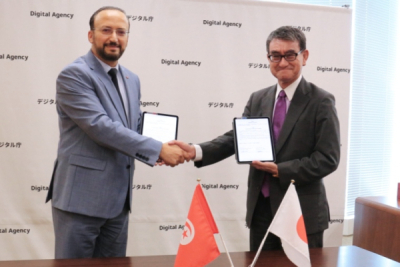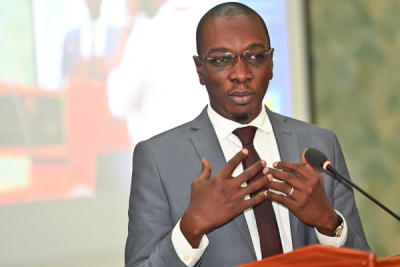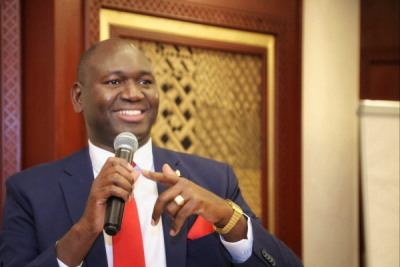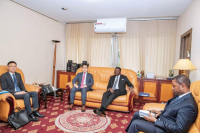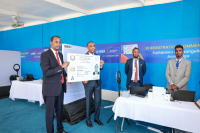
Public Management (603)
In Africa, the digital ecosystem still has enormous potential to stimulate economic recovery, promote opportunities, advance social equality, and create jobs. It is therefore urgent to develop this ecosystem through North-South partnerships.
On Tuesday, October 17, Léon Juste Ibombo (photo, right), Congo’s Minister of Posts, Telecommunications and Digital Economy, granted an audience to Eugene Stewart Young (photo, left), US Ambassador to the Republic of Congo.
The two officials discussed, among other things, strengthening cooperation between the United States and Congo in the digital economy and postal sectors.
According to Eugene S. Young, the purpose of the meeting was to define areas of digital cooperation and identify projects to be implemented shortly. "We also talked about our priorities, the Embassy's priorities, the Minister's priorities, and new developments in the telecommunications sector. I look forward to continuing the discussions with the Congolese side," he said.
This new initiative is fully in line with the strategy put in place by the Ministry of Telecommunications to kick-start the development of the digital economy in Congo. In recent years, the country has implemented initiatives to attract international partners. The aim is to multiply collaborations that could lead to the construction of new digital infrastructures, the development of digital skills in the public and private sectors, the modernization of services, and the provision of quality Internet connection.
The audience comes after the US government's decision, in December 2022, to devote $55 billion to Africa over three years for the development of several sectors, including digital, through the Digital Transformation in Africa (DTA) initiative.
Samira Njoya
In January 2019, Senegal signed a memorandum of understanding with France's National Centre for Space Studies and Ariane Group. The first spinoffs were expected for 2021, but it seems things are finally falling into place.
The Republic of Senegal will receive its first satellite, baptized GAINDESAT, on November 10, after three years in the making, the Ministry of Higher Education, Research, and Innovation (MESRI) announced in a press release published on its web portal on Friday, October 13.
"After three years of hard work, Senegal's first satellite will be delivered on November 10, 2023, during a ceremony to be presided over by the MESRI on the premises of the Centre Spatial Universitaire de Montpellier [CSUM] in France," the release points out.
The nanosatellite is part of the SenSAT space program launched by the government to meet the country's needs for space products and services and to make the space sector a key driver for its socio-economic and sustainable development. It is the result of a partnership agreement signed, in January 2019, by MESRI and the Centre Spatial Universitaire de Montpellier.
The €1 million agreement catered for the training of eight engineers and five technicians in the manufacture and operation of space tools. Under the supervision of MUSC engineers, the beneficiaries designed and built Senegal's first satellite.
Once the satellite is delivered, the government will set a date for its launch. The satellite was initially scheduled for launch in 2021, but COVID-19 and its impacts forced the government to postpone the operation until this year.
According to Senegalese authorities, the nanosatellite will connect to all the stations on each pass, draw in all the data recorded by these stations, and transmit them directly. The data, in turn, will help prevent and combat bushfires, floods, and erosion, as well as develop agriculture, among other things.
Samira Njoya
Tunisia wants to capitalize on accelerating digital transformation to modernize its administration. For that project, the North African country sees Japan as a key partner.
On Tuesday, October 10, Tunisia's Minister of Communication Technologies, Nizar Ben Neji (photo, left), and his Japanese counterpart for Digital Transformation, Taro Kono (photo, right), signed a memorandum of understanding aimed at promoting bilateral cooperation in the field of digital transformation and modern technologies.
The memorandum, signed on the sidelines of Mr. Ben Neji's current visit to Japan, covers e-government, digital transition, experience sharing, data analytics, e-payment, digital identity, cloud, artificial intelligence solutions, and more.
"This memorandum is also a translation of the commitment of both countries to strengthen and open the horizons of cooperation between Tunisia and Japan to benefit from global best practices and opportunities available in the fields of digital transformation and modern technologies to develop government services for citizens and institutions, promote innovation and entrepreneurship, and support sustainable development goals," said the Tunisian Ministry of Communication Technologies in a statement.
The signing of this memorandum of understanding is part of the actions undertaken by the Tunisian government in recent months to promote digital transformation. It comes a few months after the signing of a memorandum of understanding with China to promote collaboration in several areas, including digital infrastructure, research and innovation, skills development, digital technology development, cybersecurity, the digital economy, and the exchange of expertise.
The new protocol will enable Tunisia to take advantage of Japanese expertise and make considerable progress towards achieving the objectives of its digital strategy, which is due to be implemented by 2025. It will also enable Japan to "benefit from Tunisia's experience in several e-government projects, in particular the digital identity project, information exchange, cybersecurity regulation and the encouragement of startups," said Taro Kono.
Samira Njoya
The Chinese video-sharing platform TikTok is enjoying great success on the African continent. While some countries have no problem with it, Senegal considers the application to be a threat to national stability.
TikTok will remain suspended until further notice in Senegal, Minister of Communication Moussa Bocar Thiam (photo) said at a press conference last October 5. According to the government official, the government is in talks with the social network’s executives to lift that suspension.
"It's an unfortunate situation because our objective is [to guarantee] the free use of this platform [...] For the moment, the restriction is maintained pending the conclusion of a comprehensive written agreement," he said.
Three conditions were set out for the lifting of the suspension. Firstly, the Minister insisted on the need for TikTok to put in place a mechanism guaranteeing the deletion of fake accounts and accounts with subversive content. He also called for a local representation in Senegal.
Finally, the government called for regulation of the application's algorithm in Senegal, to control content that could run counter to Senegalese values and negatively influence young people. According to the Minister, it's a question of knowing what content is being offered to Senegalese.
The ban on TikTok was imposed in August following the arrest of opposition leader Ousmane Sonko. At the time, Senegalese authorities said it was "the preferred network used by malicious individuals to spread hateful and subversive messages threatening the country's stability."
Despite being banned in the country, it is still widely used by the Senegalese youths who use means like VPNs to bypass censorship.
Samira Njoya
With the advent of digital technology, Kenya has turned to biometrics to improve the identification of its population. Thanks to a system already in place, in the coming months the executive will be able to provide a digital identity to all registered citizens, refugees, and foreigners.
Kenya has postponed the launch of its "Maisha Namba" digital identification system and biometric identity cards originally scheduled for October 2. In a statement released on Friday, September 29, Julius Bitok (photo), Principal Secretary of Immigration and Citizen Services, said that a new date would be communicated in due course.
“We wish to inform the public and all stakeholders that due to unavoidable circumstances, the official launch of the Maisha number and the digital ID ecosystem that was to be presided over by his excellency, President William Ruto on October 2nd has been postponed,” Julius Bitok indicated in the release, adding that nationwide public and stakeholder engagement activities and forums on Maisha Namba would continue as planned.
Last August, when signing an agreement with the UNDP to raise funds to support the development of the said system, the government indicated that it would be launched on October 2. The system is in line with the executive's actions to improve government services through digital transformation, to digitize up to 80% of the said services. Through the new system and the biometric identity card, the government aims to provide every Kenyan with a unique number that will become his/her personal identity number for life.
Samira Njoya
During Buhari's presidency, Isa Pantami, the former Minister of Digital Economy, succeeded in making Nigeria shine on the international technological and digital scene. His successor wants to do even better in the next four years.
Bosun Tijani (photo), the Nigerian Minister of Digital Economy appointed last August, plans to lead Nigeria into the ranks of thriving digital nations. To this end, on August 2, 2023, on X (formerly Twitter), he unveiled a draft strategic plan that would serve as a catalyst for the development of the technology economy over the next four years.
The plan, entitled "Accelerating our collective prosperity through technical efficiency", is built around five key economic pillars: Knowledge, Policy, Infrastructure, Innovation, entrepreneurship & Capital (IEC), and Trade.
According to the Minister, the plan has been carefully drafted based on extensive engagement with stakeholders from the Ministry of Digital Economy, departments, units and parastatals, ecosystem stakeholders, and his immediate team.
Among other things, the plan in its implementation calls for the training of 3 million tech talents by 2027, increasing the digital literacy level of the population to 70% by 2027, and positioning Nigeria in the top 25th percentile of research globally in 6 key areas: artificial intelligence (AI), unmanned aerial vehicles (UAVs), IoT, robotics, blockchain, and additive manufacturing.
In terms of infrastructure, the government's ambition is to provide data download speeds of 25 Mbps in urban areas and 10 Mbps in rural areas by the end of 2025. Coverage will also be increased to 80% of the population, with a particular focus on underserved and unserved populations.
Aware that startups play a vital role in the development of the digital economy, the government plans to increase to 100% the number of technology startups with access to public procurement opportunities in Nigeria. To this end, the Ministry and its partners are committed to supporting programs focused on AgriTech, HealthTech, EdTech, MediaTech, CleanTech, CreTech, among others.
Speaking of commerce, which is the final axis of the strategy, the federal government plans to increase spending on e-commerce to $75 billion by 2025. The aim is to boost Nigeria's participation in global technology trade over the next four years.
The plan, which will be continually refined, is in line with President Bola Tinubu's program unveiled last May. The program is based on seven strategic axes, including the creation of one million jobs in Nigeria's ICT sector within the next two years.
Samira Njoya
The ongoing digital transformation has shown its potential to accelerate development across Africa. Recognizing that potential, most countries on the continent are embracing it to speed up the achievement of development goals.
Kenya has joined the Pan African Payments and Settlement System (PAPSS), Trade Cabinet Secretary Moses Kuria announced on X (formerly Twitter) on September 29.
According to the government official, the "Central Bank of Kenya has signed the instruments that have finally seen Kenya join the Pan African Payments and Settlement System (PAPSS)."
Kenya's participation in PAPSS is a significant step towards promoting smoother and cost-effective intra-African trade and enhancing economic collaboration across the continent.
The move further strengthens the African Continental Free Trade Area (AfCFTA) initiative as it enables Kenyan companies to settle trade transactions with other countries in the PAPSS network using local currencies.
PAPSS, launched in January 2022, is a digital centralized payments and settlement system designed for intra-African trade. It is headquartered in Cairo, Egypt, and is overseen by African Central Banks. With more than 25 leading banks across Africa, including Ecobank, Zenith Bank, and Stanbic, connected to it, the system simplifies payment transactions. It enables companies to settle trade transactions in their local currencies, helping save on foreign exchange costs and the liquidity challenges companies would have faced if they were to rely on non-African correspondent banks for trade settlement.
The introduction of this system will help African nations save close to $5 billion annually in trade transaction costs.
Hikmatu Bilali
After inaugurating digital learning centers in Mauritania last June, Digital School is shifting up a gear on the dark continent.
Dr. Waleed Al Ali, Secretary General of Digital School, and Ute Klamert, Deputy Executive Director of the World Food Programme (WFP), signed a memorandum of understanding at the United Nations General Assembly, the Emirates News Agency (WAM) reported on Friday, September 22. The MoU aims to broaden the scope of the Digital School initiative's activities, strengthen partnerships, and reach rural communities and students across sub-Saharan Africa.
"The future of education relies significantly on the utilization of digital solutions, which are a pivotal factor in empowering students worldwide to access quality education. The launch of the new partnership reflects the Digital School's humanitarian message and translates its endeavor to expand the circle of interest and reach more students across the African continent," said Omar Sultan Al Olama, UAE Minister of State for Artificial Intelligence, Digital Economy and Telework Applications and Chairman of Digital School's Board of Directors.
Since the Covid-19 pandemic, distance learning has emerged as an attractive alternative to traditional training. With an Internet connection, it is possible to receive training in a variety of fields by attending online courses or consuming content (video and/or audio) uploaded to web platforms. Education technology startups are proliferating on the continent, and authorities are joining forces with various technical partners to improve Internet quality. However, Internet penetration in sub-Saharan Africa remains low, at around 30% presently.
Present in eight countries worldwide, including two in Africa (Mauritania, and Egypt), Digital School was launched in 2020 and has already trained over 1,500 trainers and welcomed over 60,000 students. Last June, it strengthened its presence in Mauritania by inaugurating 66 digital learning centers, to spread digital education skills and solutions throughout the Arab region.
Adoni Conrad Quenum
Information and communication technologies have become key drivers for efficiency and growth in several economic sectors. Realizing the importance of such technologies, Cameroon is stepping up initiatives in the digital sector. The government recently launched a major project to rapidly develop the sector.
On Friday, September 15, Cameroon’s State Minister Ferdinand Ngoh Ngoh granted an audience to a delegation of Chinese tech giant Huawei. According to local media, during the audience, the two parties discussed a range of topics, including the development of the digital sector in Cameroon.
"Given Cameroon's potential, Huawei Group officials reaffirmed their commitment to working alongside the country to develop a high-level national strategy for the digital economy, to make Cameroon an ICT hub in the French-speaking African region," reports the state-owned daily Cameroon Tribune.
The technology group's visit to Cameroon comes a month after the launch of the Project for the Acceleration of Digital Transformation in Cameroon (PATNUC). The project, financed to the tune of $100 million by the World Bank, is designed to accelerate the country's digital transformation through three main complementary components on the supply and demand sides of the digital economy, with a particular focus on digitizing the agricultural sector.
Thanks to this mutual commitment, Cameroon will be able to benefit from Huawei's technological advances and expertise to strengthen its digital sector and foster economic development. The two parties will also be working together to transfer ICT technology to Cameroon's youth, as well as promote rural electrification using solar energy and develop the concept of smart cities using video surveillance at the national level.
Samira Njoya
In Africa, governments are gradually adopting tech solutions to address document fraud, identity theft, terrorism, and cybercrime as well as upgrade to international standards.
The Federal Republic of Somalia will start issuing biometric identity cards to its citizens. On Sunday, September 17, on the sidelines of a conference organized in Mogadishu by the National Identification and Registration Authority (NIRA), Prime Minister Hamza Abdi Barre inaugurated the Somali National Identification System (SNIDS).
Designed with the help of a multi-million dollar grant from Pakistan, the new system aims to provide Somalis with a secure and universally recognized form of identification.
The SNIDS digital solution was developed by NIRA in partnership with NADRA, Pakistan's National Database and Registration Authority. It is the result of a partnership signed by the two institutions in 2017. It aims to issue identity cards to at least 15 million Somalis, including children, by 2026. It is in line with "ID4Africa", a movement that aims to provide all Africans with a digital identity by 2030.
The system will assign a unique identification number (NIU) based on demographic and biometric data to any individual of Somali nationality or resident in Somalia. According to the Prime Minister, this identity number will serve as an identification document for each individual until his or her death. This data, together with the NIU, will make it possible to set up a central, secure, and reliable database that will serve as a reference for verifying the identity of beneficiaries of public, private, or social services.
"NADRA takes immense pride in the successful execution and launch of Somalia's National Identification System. This achievement reinforces Pakistan’s vision for a more secure and prosperous Somalia, where every citizen has access to reliable identification. The National ID System will not only bolster security but also pave the way for inclusive development, financial empowerment, and improved governance," said NADRA Chairman Asad Rehman Gilani.
Samira Njoya
More...
Over the past few years, digital adoption and digitization have grown steadily across Africa. Well aware of the importance of that digital sector for the development of several sectors, Morocco is stepping up efforts to fully capitalize on the opportunities offered.
On Friday, September 15 in Rabat, the Moroccan Ministry of Digital Transition and Administrative Reform (MTNRA) and the German International Development Cooperation Agency (GIZ) signed two partnership agreements. The agreements aim to promote digital transformation of the public administration and the digital inclusion of very small and medium-sized enterprises (VSEs) and small and medium-sized enterprises (SMEs) in Morocco.
The first agreement, worth 3 million euros, will run for 3 years. It aims to support public agencies and institutions in their efforts to modernize services offered to citizens.
The second partnership, valued at 5 million euros, is dedicated to enhancing the technical and organizational capabilities of institutional stakeholders committed to promoting digital inclusion among SMEs. This initiative will oversee the development of mechanisms designed to lower transaction costs for service providers, ensuring the seamless digitization of SMEs and bolstering their capacity to leverage tailored services for their digital transformation. This agreement will be in effect for 4 years.
The new agreements complement several others recently signed with major national and international tech companies to promote the digital sector in Morocco. They are in line with Maroc Digital 2020– Now Maroc Digital 2025– that sets digital transformation of the public administration as one of its key focuses.
According to Ghita Mezzour (photo, center), the Minister Delegate in charge of Digital Transition and Administrative Reform, modernizing the administration is one of the Ministry's biggest projects, as it strives to increase efficiency and performance, and make administrative procedures and processes more transparent and accessible, in line with directives of the King of Morrocco.
Tanzania aims to become one of the leaders in the digital sector in Africa. To achieve this goal, the executive is focused on building a strong digital infrastructure.
The Tanzanian government is currently working on the implementation of several citizen-centric digital infrastructures, including the construction of a National Enterprise Services Bus (NESB), a GovTech Innovation Center, and a National Services Directory.
The projects were announced by the Minister of Information, Communication, and Information Technology, Nape Nnauye (photo), at the end of the "Connect-to-Connect 2023" summit held from Saturday, September 9 to Sunday, September 10 in Zanzibar.
In his concluding address, the Minister specified that the National Enterprise Services Bus will facilitate the transparent sharing of data between public and private sector companies. The creation of the GovTech Innovation Centre and the Tanzanian Services Directory is a crucial step in improving the dissemination of information services for government and private entities.
The said initiatives are part of the "Revised National ICT Policy 2023", which aims to create a sound policy environment to narrow the smart device penetration gap in the country and drive digital transformation.
The revised policy “seeks to strengthen the research and innovation ecosystem, encouraging individuals and innovators to generate creative solutions for addressing pressing social issues and also prioritizes cyber security and the development of future-ready ICT human resources in the country,” explained Minister Nape Nnauye.
Tanzania recently multiplied partnerships with other countries and international companies to accelerate the digital transformation of its economy. The government also announced several investments in the Zanzibar Archipelago aimed at making the island a technological innovation hub par excellence in Africa.
According to the Minister of ICT, these initiatives have enabled Tanzania to rank among the top digital performers in Africa. Among other things, the country ranks 23rd worldwide on the World Bank's GovTech 2022 Maturity Index (GTMI).
Samira Njoya
Mauritania, like several African countries, is stepping up efforts to develop entrepreneurship and support startups and SMEs. For more efficiency, the country needs a framework that will govern all of its actions.
On Saturday, September 9, the Mauritanian Parliament approved the Startup Act, the draft startup law in Mauritania, the Ministry of Digital Transformation announced this in a press release published by local media.
"The purpose of this law is to promote the creation and promotion of startups in Mauritania [by focusing on] creativity, innovation, the use of new technologies, the achievement of high added value as well as national and international competitiveness," the release informs.
The draft law was initiated by private and public stakeholders of the Mauritanian tech industry in March 2022. On September 7, 2023, it was presented to Ministers at the Ministerial Council held that day. The law is part of the Islamic Republic of Mauritania's overall strategy for the development of the digital economy and innovation. Its main objective is to define an incentive-based legal and institutional framework for the creation and development of young technology companies in Mauritania.
According to the country's authorities, the law includes provisions such as conditions for granting the startup label and support as well as conditions for access to tax, customs, and miscellaneous incentives to facilitate the installation and development of startups.
Once promulgated by the President of the Republic and implemented, the Startup Act should facilitate startups’ access to financing and investment, both locally and internationally. The aim is to label 300 startups over the next five years, support a dozen or so entrepreneurial support institutions –therefore helping create 3,000 direct jobs– and contribute to the digital economy at a rate of around 2.5 million MRU ($66,000) in sales per labeled startup.
Samira Njoya
Internet for all is a major development challenge for East African countries. Despite the ambitions stated in national development plans, several countries are struggling to provide better connectivity for their populations. Setting up a joint project could provide a solution to that challenge.
The East African Community (EAC) will be launching an Eastern Africa Regional Digital Integration Project (EA-RDIP 2023-2028) in the coming months. Daniel Murenzi, CAE's Senior ICT Officer, announced the 10th edition of the East African Internet Governance Forum (EA-IGF), held on Tuesday, September 5, in Kigali, Rwanda. The project aims to meet the connectivity needs of countries in the Horn of Africa.
"The Eastern Africa Regional Digital Integration Project is in response to the discussions and recommendations of the 9th East Africa Internet Governance Forum and aims to drive digital market integration by expanding broadband connectivity and improving the digital service environment," said Daniel Murenzi.
The five-year World Bank-backed project aligns with regional priorities, focusing on the need to bridge the digital divide, reduce connectivity costs, and empower marginalized groups such as youth, people with disabilities, and women. The aim is to boost access to broadband and digital services, fostering the development and integration of digital markets in East Africa.
To achieve this goal, the EAC relies on the Internet and partnerships between member states. Strategies will be put in place to ensure that Internet access is affordable for all. In January, East Africa boasted 23.1% Internet penetration, benefiting 110.7 million people, equivalent to 8.4% of its population.
Once implemented, the project will support cross-border connectivity, data harmonization, e-commerce regulations and policies, and the removal of trade barriers, to establish a single digital market.
Samira Njoya




